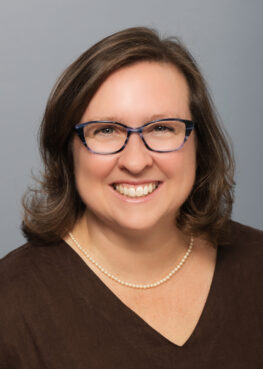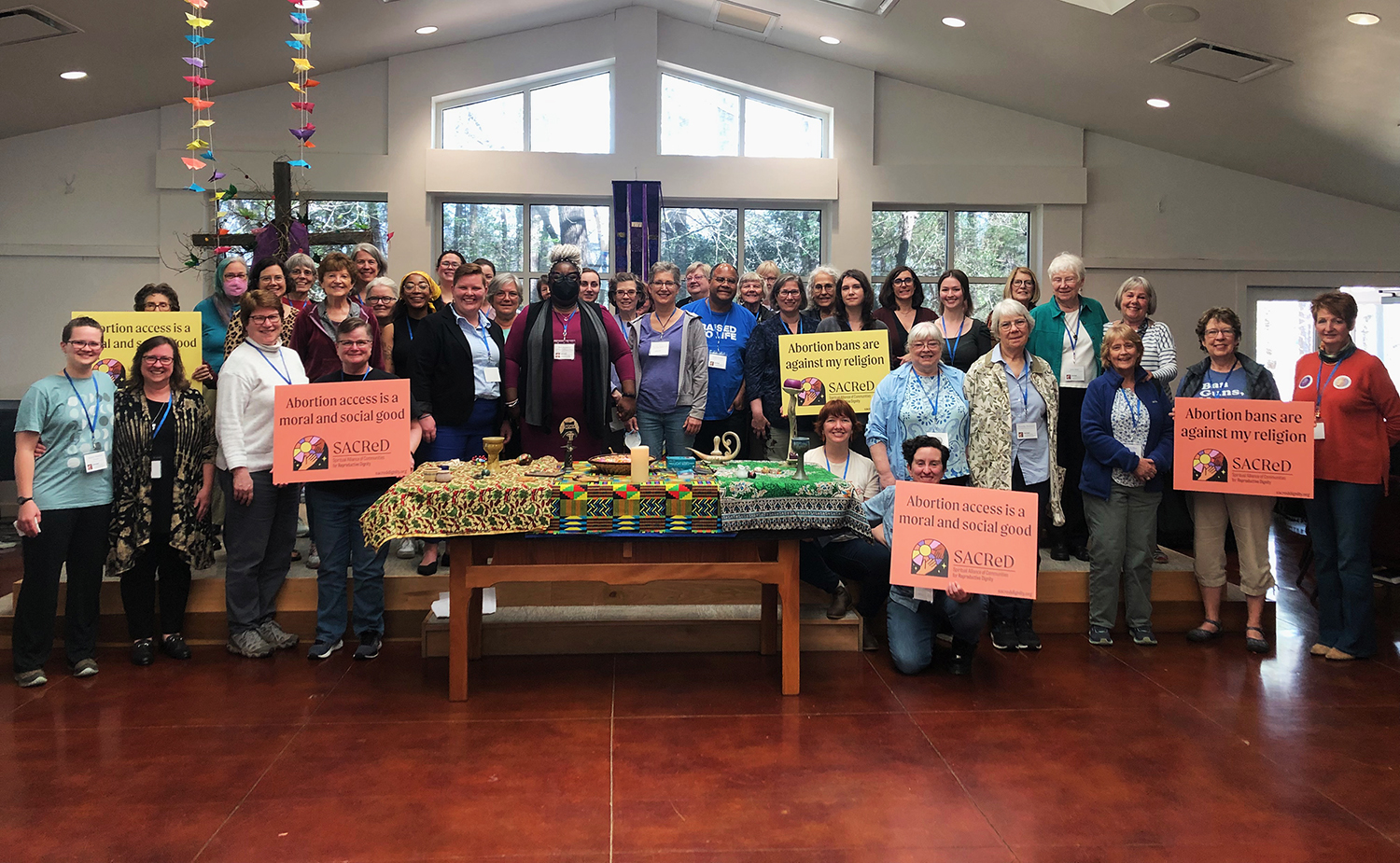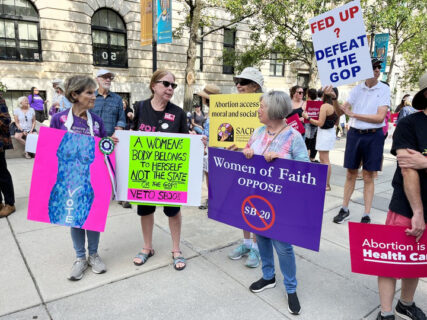
CHAPEL HILL, N.C. (RNS) — The Rev. Rebecca Todd Peters’ neon pink stole bearing the Planned Parenthood logo announced her subject even before she ascended to the lectern.
When she started preaching, she got right to the point. “Abortion makes many people profoundly uncomfortable,” she told a crowd of 200 at the Community Church of Chapel Hill, a Unitarian Universalist congregation “ — at dinner parties, in polite conversation, with friends and family and, too often, in church.”
Her sermon, like countless others she has given recently, aimed to challenge the perception that people of faith are against abortion and to tell the stories of women who have had them.
An ordained minister in the Presbyterian Church (U.S.A.) and a professor of religious studies at Elon University, where she heads the Abortion and Religion project, Peters is best known as one of the country’s leading ethicists on abortion rights.
Since the U.S. Supreme Court announced in May 2021 that it would hear Dobbs v. Jackson, the case that would eventually overturn Roe v. Wade, Peters has given more than 55 sermons and lectures on abortion across the country. Lately, she’s been especially in demand in North Carolina, after a new law banning most abortions after 12 weeks of pregnancy and restricting abortion-related medications went into effect earlier this month.
Until last year, abortions were legal in North Carolina until fetal viability, generally between 24 and 28 weeks of pregnancy. Last August, a judge ruled that abortion was no longer legal after 20 weeks.
The new 12-week ban, which passed with lightning speed by North Carolina’s Republican-dominated legislature, stunned many state residents, and especially members of the religious left.
While most liberal Protestant denominations — including Lutheran, Presbyterian, Methodist and Unitarian Universalist — have official positions in support of reproductive rights, Peters said these groups too often duck conversations about abortion, leaving Catholics and evangelical Christians to win the day with messages that abortion is a sin.

Rebecca Todd Peters is a professor of religious studies at Elon University, author and community leader. Photo courtesy of Peters
Her mission is to step into that void. As a first step she talks about her own reproductive history, gladly volunteering that at 55, she is married, has two children and has undergone two abortions.
“I felt God’s presence with me as I made the decision to end two pregnancies and I felt no guilt, no shame, no sin,” she told the congregation in Chapel Hill. “A forced pregnancy or birth is not holy.”
Peters, whose father was a pastor, has been working in the church and on reproductive issues since her first job after college. Working in the women’s advocacy office of the Presbyterian Church’s Louisville, Kentucky, headquarters, she began volunteering to escort women to an abortion clinic amid crowds of hostile protesters shouting, yelling and intimidating the women.
“These people said they were Christian, and it was just this huge disconnect for me — this, cognitive dissonance,” she said. “How can these people say that they are loving Christians and be so horrible?”
It set her on a path to study the role of Christianity in shaping cultural attitudes on abortion. She earned a master’s of divinity and later a Ph.D. in Christian ethics at Union Theological Seminary in New York. Her mentor there, Beverly Wildung Harrison, wrote the 1983 classic “Our Right to Choose.”
Peters wants to push back against a moral framework around abortion that requires women to justify their reasons for ending a pregnancy. In this, she’s referring not only to the typical justifications — rape, incest or the life of the mother — but any justification. The underlying assumption is that abortion is wrong and that women have an obligation to bear a child, an idea Peters believes is rooted in Christianity’s patriarchal vision of womanhood.
RELATED: Poll: Support for abortion rights is strong, even among most religious groups
This framework leads women to feel ashamed about abortion, effectively silencing them. The pregnant woman is erased, replaced with ultrasound photos of the fetus.
Peters instead advocates for reproductive justice, a term that originated among Black community leaders who felt the focus on abortion rights was too narrow and needed to be expanded to include concerns about reproductive health care more generally.
Not all listeners at the Community Church of Chapel Hill accepted Peters’ arguments. One church member who declined to give her name said Peters neglected to mention one of the Ten Commandments: Thou shalt not kill.
But far more people gave Peters an enthusiastic thumbs-up.
Outside the Community Church sanctuary a long line of people stood to greet Peters, among them four women who are reading her 2018 book “Trust Women” as part of their Presbyterian church’s reading group. The group invited Peters to speak at their church. One of the women asked her to sign her copy.

The members of SACReD join together for a group photo during a training. Photo courtesy of Rebeca Todd Peters
“I just think she hit it head-on; she nailed it,” said Rosanne Tiller, a 37-year-old physician and a mother of two who is now expecting her third.
Tiller said her favorite message from Peters is the three-pronged statement of the reproductive justice movement: Women have the right not to have a child; the right to have a child; and the right to raise a child in a safe and healthy environment.
Polls, such as a recent PRRI survey, show majorities of American religious groups support legal abortion. White evangelicals, Jehovah’s Witnesses, Latter-day Saints and Hispanic Protestants are the only exceptions. Even among those groups, support for legal access has been growing.
Religious congregations in North Carolina have begun stepping up their support for legal abortion. In the state’s Triangle region, an interfaith coalition on reproductive justice formed this past spring, with members of Presbyterian, Baptist, Quaker, Unitarian Universalist and Jewish congregations.
Next month, the group will screen a new documentary called “Plan C,” about activists and providers who are building a network to mail abortion pills, such as mifepristone and misoprostol, to women who need it. One of the churches in the coalition is also planning a two-day symposium this November on reproductive issues.

Beth Welton of Chapel Hill’s Church of Reconciliation holds a sign that reads “Women of Faith of Oppose SB 20,” the new North Carolina law banning abortion after 12 weeks of pregnancy. Welton demonstrated against the law in Raleigh, the state capital, in June. Photo courtesy of Beth Welton
Beth Welton, one of the coalition’s organizers, called the day in June 2022 when the Dobbs decision was handed down “one of the most horrifying days I’d experienced as an adult.”
“We were just complacent,” said Welton. “We got out-talked. That’s why it’s so terribly important as a coalition that we continue to grow and have a narrative to counter that other narrative that people of faith are opposed to abortion.”
Other North Carolina churches have joined SACReD, the Spiritual Alliance of Communities for Reproductive Dignity, which Peters co-founded with partners in Texas, with the aim of shifting the cultural paradigm around abortion.
RELATED: Catholic Democrats issue new ‘statement of principles’ defending abortion rights
The group’s first in-person training took place in Chapel Hill in April. Peters helped write SACReD’s seven-week curriculum that provides religious congregations with guides for small-group discussions about sex, reproduction and abortion.
Peters is not waiting for churches to subscribe to the curriculum. She is delivering sermons as far from home as Wisconsin and Minnesota, filled with pithy statements designed to startle her mainline audiences into action: As she told the Community Church of Chapel Hill: “Abortion is a moral good. Abortion is an act of love. Abortion is an act of grace,” and finally: “Abortion is a blessing.”
